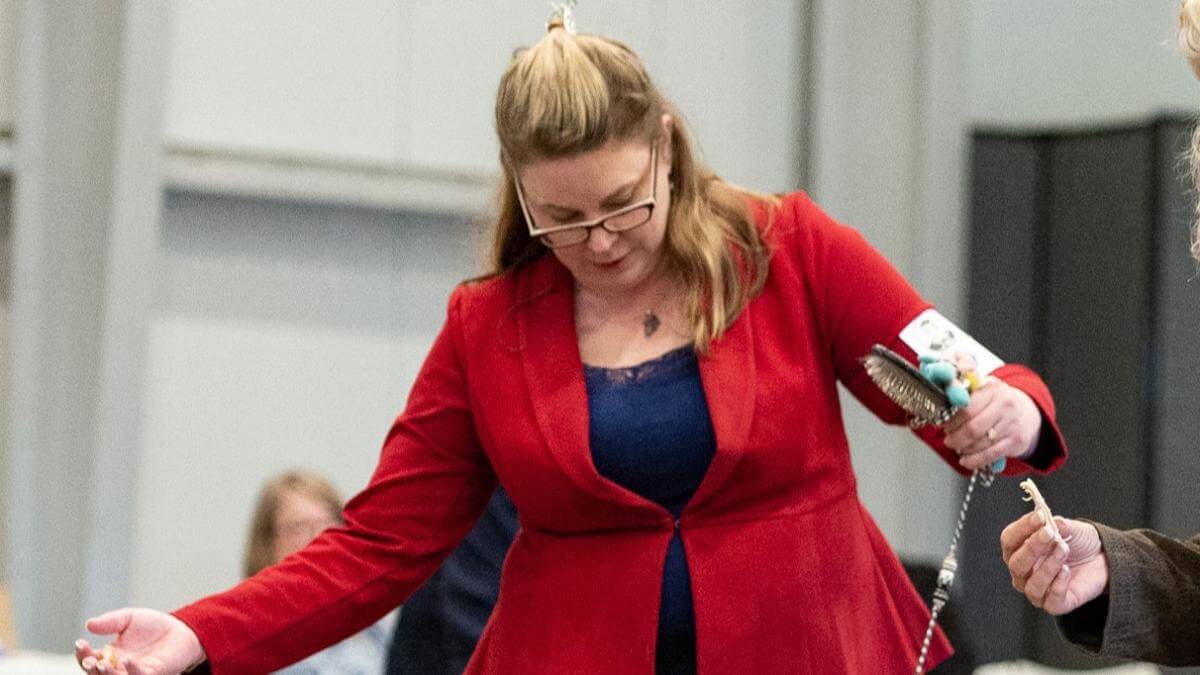
Home » April Hain Trevino, M.D. | Maverick Collies

April Hain Trevino, M.D.
1. My name is April Hain Trevino, M.D., and together with my husband, Frank Trevino, we are based in the Texas Hill Country, just outside of San Antonio in the town of Boerne. Our journey with Collies began back in the early 1990s while we were still in high school. I was training my Shetland Sheepdog in Obedience when I met Frank in our sophomore algebra class. He owned a tri-color Collie and kept a photo of her tucked into the clear cover of his notebook. Frank had developed an early interest in the breed and had already joined the Collie Club of San Antonio, so we began attending meetings together.
At that time, several well-known and respected Texas breeder-judges—such as Chip Atkins and Bettie Crawford—were active in the club. We soaked up everything we could from them, eagerly reading every Collie book, magazine, and article we could find and listening closely to their insights on breeding, training, and judging. Eventually, we both left for college to attend Texas A&M University. Although we dreamed of becoming more involved in the sport, life took its course: We married, I pursued medical school, Frank launched a business, and we began raising our family.
It wasn’t until 2008 that we were finally able to acquire our first show-quality Collie. From that moment on, we’ve been fully immersed in the breed. Those early high school experiences lit a spark in us—a deep appreciation for the Collie’s beauty, intelligence, and gentle spirit—that has only grown over the years. Over the past 17 years, we have thoughtfully developed our breeding program under the name Maverick Collies, with a focus on producing healthy, structurally sound, and well-tempered Collies that remain true to the AKC (American Kennel Club) Breed Standard.
2. The essence of the Collie lies in its unmistakable expression—a harmonious blend of refined headpiece, almond-shaped eyes, and intelligent gaze that conveys sweetness, dignity, and alertness. Proper structure, balance, and movement are equally important, as this is a working breed at heart. Soundness in body and mind allows a Collie to fulfill its traditional role as a herding and companion dog. We place great emphasis on preserving the classic Collie outline and expression, along with calm, intuitive temperaments and excellent health. These attributes are essential to maintaining breed type, and we believe they must be preserved with integrity for the future of the breed.
3. Yes, absolutely. In our experience, demand for well-bred Collies remains strong, and we are fortunate to have an extensive waiting list of wonderful families who have taken the time to apply, interview, and stay in touch while waiting for the right puppy. We typically have reservations in place six to nine months—or more—in advance of a planned litter. Our program is intentionally limited in scale to ensure that each puppy receives early training, socialization, and individual attention, so homes are carefully selected and thoroughly vetted. We feel confident that our planned litters are well supported by committed, educated homes.
Maintaining a well-designed website is essential for effectively communicating with the public. It serves as a central resource for breed education, information on puppy and adult availability, expectations regarding wait times, and overall insight into our breeding program and philosophy.
4. All of the dogs in our breeding program undergo comprehensive genetic health testing for Collie Eye Anomaly (CEA), Progressive Retinal Atrophy (PRA), and several other inheritable conditions. We are fortunate to have the support of the Collie Health Foundation, whose mission is to fund medical research that advances the long-term health of the breed, while also educating both breeders and the public on important health issues. The Foundation offers subsidies that help make genetic testing more accessible and affordable, which has been instrumental in allowing breeders to make significant progress in reducing the incidence of many inherited conditions.
On the communications side, we maintain an active Facebook page and an informative website, and we use email to manage applications, share educational resources, and provide regular updates to families on our waiting list. We also utilize AKC’s digital record-keeping system, and the microchip database from AKC Reunite, to ensure lifelong traceability and continued support for every Collie we’ve bred.
5. Yes, we’ve observed a growing appreciation for responsible, conservation-based breeding. More families today are asking thoughtful questions about health testing, temperament, and the purpose behind Breed Standards. There’s still education to be done—particularly around the difference between responsible breeders and commercial or backyard breeders—but we’re encouraged by how many people now understand the value of working with a reputable breeder. We’ve made it a priority to help bridge the gap by offering educational materials and being transparent about our process. As a result, we’re seeing more respect for breeders who prioritize ethics, health, and the long-term welfare of their breed.
6. Some concerning trends in the dog show world include an increasing emphasis on flashy presentation over correct structure and soundness, and a growing preference for extreme features that stray from established Breed Standards. Social media has further complicated the landscape by promoting popularity over merit and enabling less-experienced or profit-driven breeders to gain visibility without adhering to the health or ethical standards our community strives to uphold. The rising costs of campaigning and travel have also made the sport less accessible, potentially discouraging passionate newcomers from entering the ring.
That said, there are also encouraging developments, including a stronger focus on health testing, breeder accountability, and owner education. These are positive steps toward preserving the integrity of our breeds, and they reinforce the importance of remaining vigilant and committed to responsible breeding practices.
7. One of the most positive developments we’ve seen is a growing focus on health and welfare. Breeders are now more equipped with genetic tools and veterinary partnerships to make informed breeding decisions that reduce the risk of inherited disease. There’s also been progress in the transparency of breeding practices, with many breeders—including us—using websites and social media to educate the public, showcase accomplishments, and build lasting relationships with families. Within the Collie world, we’re encouraged by the continued dedication to preserving the breed’s hallmark traits and the camaraderie among breeders who are committed to its long-term conservation.